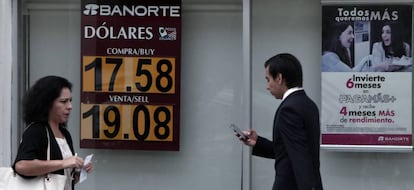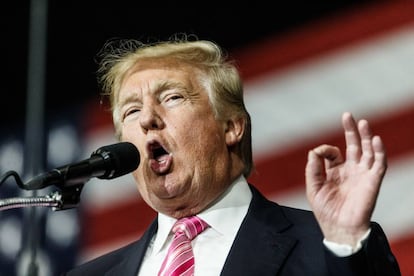How the specter of Trump is rattling the Mexican peso
Currency will have a hard time recovering if the Republican presidential candidate is voted in

Tall, blond and vociferous. That’s what the greatest threat to the Mexican peso looks like these days. After a devastating oil crisis, the Mexican peso must now face the hurricane unleashed by a Donald Trump candidacy. Projections are bleak. Every time he rises in the polls, waves of panic sweep across Mexico. A Trump victory in November’s presidential election would be an earthquake of unknown magnitude. People inside and outside the Mexican government are preparing for the worst. “Trump is a devastating hurricane, especially if he does what he has promised during the campaign,” says the usually restrained Agustín Carstens, the governor of the Bank of Mexico.

These fears run deep. The peso is showing signs of weaknesses that analysts believed it had overcome. It has lost 25% of its value in less than a year and, two weeks ago, it officially became the most battered currency in the world when it sank below 20 pesos per dollar, breaking its historic low. In Mexico, a country that watches the movements of its currency on the market as a sick man might watch his heart rate, the collapse is seen as a dark omen. “If Trump’s words become reality, there will be a catastrophe,” says Raúl Feliz, a professor at the Center for Research and Teaching of Economics (CIDE). “Tariffs and walls would lead to a tremendous recession and sink the peso.”
The real estate mogul turned Republican presidential candidate is making Mexicans relive the memory of the past
In a search for safe haven, the Bank of Mexico has raised interest rates four times since December 2015, from 3% to 4.75%. But the results have been inconsistent. The Mexican peso improved briefly before an ill wind picked up once more. Given these circumstances, optimistic sentiment is hard to find. Few people care that Mexico, with its 2% growth rate, remains one of the most resilient economies in the region, far ahead of Brazil and Argentina. Or that its large export sector, 80% of which goes to the United States, is thriving thanks to that depreciating peso. Or that remittances from Mexicans living abroad have increased by 7.5% in the first seven months of the year, thus bringing $15 billion into the country. The memory of the past, which the real estate mogul turned Republican presidential candidate is making Mexicans relive, is stronger than all these facts combined.
The upheavals Mexico endured in the 1980s and 1990s have left their mark. From then on, Mexicans have treated the peso as a thermometer to measure the health of the country. And as the mercury rises and Trump keeps shouting, almost no one is paying attention to the fact that the collapse of the peso is partly due to the actions of Mexico’s own policymakers. “To avoid a deficit on the balance of payments caused by the slump in oil, an adjustment was made to promote exports and dis-incentivize imports,” explains Gerardo Esquivel, lecturer and researcher at Colegio de México. “That’s when the peso went from 15 to 18 units per dollar,” he adds.

Despite its depreciating effect, the maneuver was wisely administered in order to protect the average citizen from its impact. Inflation, the measure of that impact, remained steady and below 3%.
It is not all bad news after all. Even sinking oil prices, another great enemy of the Mexican economy, seem to have reached rock-bottom after the Organization of Petroleum Exporting Countries (OPEC) nations agreed to cut back on production. And a Hillary Clinton victory is still the most likely outcome of the November presidential elections in the United States. Still, none of this is enough. The mere possibility, however remote it might be, that Trump might win, makes the blood run cold. That fear runs so deep that Mexico has started to nervously evaluate its capacity to withstand the onslaught.
As long as the campaign continues, Trump will keep yelling and the peso will carry on trembling
Therefore this is not a good time for introspection. The collapse of the crude oil sector has dried up federal revenues. Not only is oil cheaper, the country is also producing less. Pemex, the largest state-owned company in Mexico and the main source of federal revenue, has suffered losses of $36 million. To fill that black hole, the government will cut spending and its borrowing levels have risen to more than 50% of GDP, an alarming picture in a country where 53 million live in poverty.
In light of these circumstances, there is no doubt that the peso will remain volatile in the short term. And as long as the presidential campaign continues, Trump will keep yelling and the peso will continue to tremble. The big question is whether the agony will end after the election or grow into a full-blown economic recession. We will know on Tuesday, November 8.
English version by Dyane Jean François.
Tu suscripción se está usando en otro dispositivo
¿Quieres añadir otro usuario a tu suscripción?
Si continúas leyendo en este dispositivo, no se podrá leer en el otro.
FlechaTu suscripción se está usando en otro dispositivo y solo puedes acceder a EL PAÍS desde un dispositivo a la vez.
Si quieres compartir tu cuenta, cambia tu suscripción a la modalidad Premium, así podrás añadir otro usuario. Cada uno accederá con su propia cuenta de email, lo que os permitirá personalizar vuestra experiencia en EL PAÍS.
¿Tienes una suscripción de empresa? Accede aquí para contratar más cuentas.
En el caso de no saber quién está usando tu cuenta, te recomendamos cambiar tu contraseña aquí.
Si decides continuar compartiendo tu cuenta, este mensaje se mostrará en tu dispositivo y en el de la otra persona que está usando tu cuenta de forma indefinida, afectando a tu experiencia de lectura. Puedes consultar aquí los términos y condiciones de la suscripción digital.








































